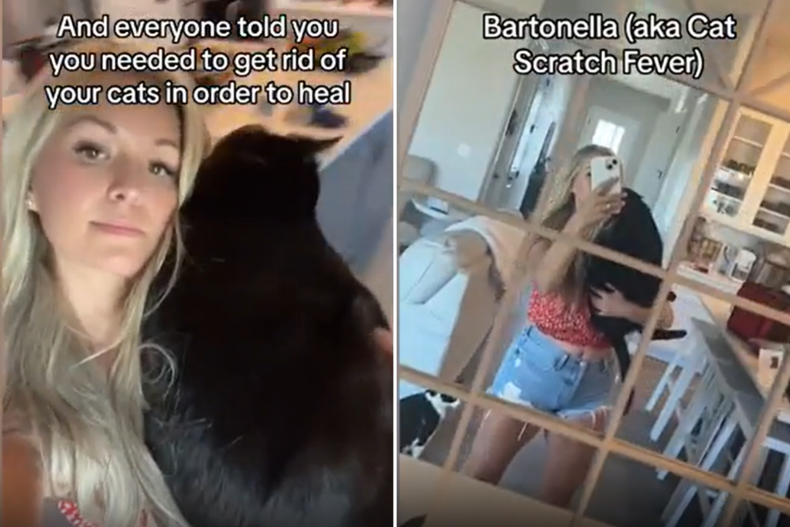Infection
Woman reveals how she caught brain parasite from her cats
After experiencing a number of strange symptoms for some time, one woman was shocked to discover that the source of her malaise was actually her cats, who had infected her with a parasite.
When Shelby Wardlaw noticed problems with her speech, joint pain, fatigue, and neurological symptoms, she couldn’t pinpoint what the root cause could be. As the symptoms showed no sign of waning, Wardlaw got tested for a number of infections, and she was horrified by the results.
Wardlaw, from Colorado, told Newsweek that she was diagnosed with a parasite called toxoplasmosis, and a bacterial infection called Bartonella, which has been “very difficult to live with.”
@shell.bee.healing / TikTok
“I was having a lot of neurological symptoms, mental disorders, speech issues, joint pain, fatigue, and flu-like symptoms, so I got tested for many infectious diseases, and these two specifically come from cats,” Wardlaw said.
The Centers for Disease Control and Prevention (CDC) says that toxoplasmosis is an infection caused by the parasite Toxoplasma gondii. People can become infected from eating undercooked meat that has been contaminated; drinking infected water; or coming into contact with contaminated cat feces, often through cleaning out a litter box.
While the CDC estimates that more than 40 million people in the U.S. are infected with the parasite, many may not experience any symptoms. Those who do may notice swollen lymph glands, flu symptoms, and muscle aches that last for over a month. It can also reduce a person’s vision, and lead to blurriness, or redness of the eye.
Wardlaw, who has always had cats in her life, also received the diagnosis of Bartonella, commonly referred to as cat-scratch disease. Information from the CDC details how fleas often carry the infection, so when a cat scratches, they can unexpectedly contaminate others with the flea stool. It may also be spread from infected cats licking an open wound or bite.
The CDC notes that stray cats are more likely to spread Bartonella, but it is certainly possible to get it from pets.
Following the shock diagnosis, Wardlaw shared her experience on TikTok in June (@shell.bee.healing) and the social-media video went viral, with more than 213,000 views and over 12,000 likes. Many social-media users encouraged Wardlaw to get rid of her cats, but she vehemently refuses to do that.
“I’ve had a lot of sympathy and agreeance from people online. But I have also had a lot of opposition from people telling me to get rid of the cats as well,” she said.
“I get very defensive and upset when people suggest getting rid of my cats. That is not the answer,” Wardlaw added.
She wrote on TikTok that she couldn’t even contemplate getting rid of her cats because it’s not their fault, and she made a lifelong commitment to them. Instead, Wardlaw is undergoing treatment to manage the infections, which she said is making it a lot easier to handle.
Dr. Shoshana Ungerleider is a board-certified internal medicine physician with expertise in infectious diseases. She says that maintaining good hygiene is crucial for treating and preventing these infections.
Ungerleider told Newsweek: “Always wash your hands thoroughly after handling cats or cleaning their litter boxes, and use gloves if possible. To further reduce risk, cook all meat to a safe temperature, as the parasite can also be contracted from undercooked meat. It’s advisable to clean the litter box daily to remove feces before they become infectious.
“In terms of treatment, humans infected with toxoplasmosis often receive antiparasitic medications. For cats, consult your veterinarian for the most appropriate treatment. Many healthy cats can clear the infection on their own, but medication may be necessary in some cases,” she said.
“While treating your cat, consider isolating it to prevent the spread of the parasite to other animals or humans in the household. Additionally, cleaning, and disinfecting areas where the cat frequents is advisable,” Ungerleider added.
The treatment for Bartonella can include antibiotics, but it can vary depending on the severity of the person’s symptoms. Ungerleider said that owners should seek help from a veterinarian if they are concerned.
“It’s crucial to consult a healthcare provider for an accurate diagnosis and appropriate treatment plan. Similarly, if you suspect your cat is infected, consult a veterinarian for a proper diagnosis and treatment plan,” Ungerleider added.
Wardlaw received hundreds of comments on her viral post, as one user wrote: “I had it for many years. Drs [Doctors] did not know what was wrong with me.”
Another TikTok user commented: “I agree! I could never get rid of them! The thought of it gives me major anxiety.”
Is there a health issue that’s worrying you? Let us know via [email protected]. We can ask experts for advice, and your story could be featured on Newsweek.

